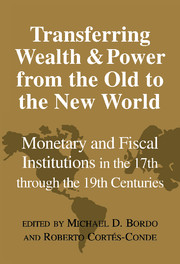 Transferring Wealth and Power from the Old to the New World
Transferring Wealth and Power from the Old to the New World Published online by Cambridge University Press: 27 March 2010
Like the other great European powers, France laid claim to a colonial empire in the Americas at the beginning of the eighteenth century. Yet, these territories were quickly lost, and there was little transfer of French institutions to the New World. While military failures were centrally important for this loss, France's flawed macroeconomic institutions imposed critical limits on the Crown's finances. This chapter examines the origins and operation of the French ancien régime's fiscal and monetary institutions. The weakness of these institutions contributed not only to France's difficulties in projecting its power overseas but also to the crisis and ultimately the collapse of the monarchy.
THE THEORY OF OPTIMAL MACROECONOMIC POLICY
The grand ambitions of the French Crown were held in check by its inability to conduct a more efficient macroeconomic policy that would raise the needed revenue while minimizing economic distortions. Theories of optimal macroeconomic policy and sovereign debt offer some insights into the weaknesses of French policy and what reforms were necessary.
In the simplest setting (Barro, 1987, 1989; Mankiw, 1987), optimal monetary and fiscal policy requires that the government satisfy a present value budget constraint where the outstanding current real government debt equals the sum of all present and future real tax revenues less all present and future real government expenditures. This may be restated as follows: the existing debt must be fully funded by cumulative budget surpluses.
To save this book to your Kindle, first ensure no-reply@cambridge.org is added to your Approved Personal Document E-mail List under your Personal Document Settings on the Manage Your Content and Devices page of your Amazon account. Then enter the ‘name’ part of your Kindle email address below. Find out more about saving to your Kindle.
Note you can select to save to either the @free.kindle.com or @kindle.com variations. ‘@free.kindle.com’ emails are free but can only be saved to your device when it is connected to wi-fi. ‘@kindle.com’ emails can be delivered even when you are not connected to wi-fi, but note that service fees apply.
Find out more about the Kindle Personal Document Service.
To save content items to your account, please confirm that you agree to abide by our usage policies. If this is the first time you use this feature, you will be asked to authorise Cambridge Core to connect with your account. Find out more about saving content to Dropbox.
To save content items to your account, please confirm that you agree to abide by our usage policies. If this is the first time you use this feature, you will be asked to authorise Cambridge Core to connect with your account. Find out more about saving content to Google Drive.